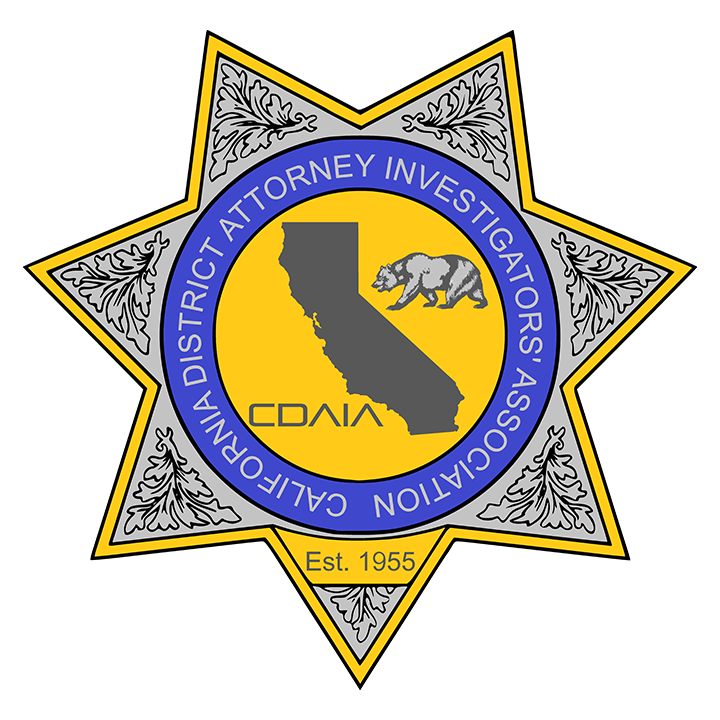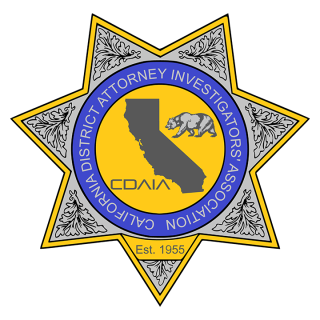The California District Attorney Investigator’s Association was formed in 1955. Over the past 45 years, the Association has provided a closer association of District Attorney’s Investigation Units throughout California and the Western United States. The Association has grown from just a few members in 1955 to our present membership of over 1300.
The following timeline represents some of the milestones the Association has accomplished throughout its history.
- 1955 – The California District Attorney Investigators’ Association had their first meeting.
- 1957 – The Association reports its membership at 129 investigators statewide. The CDAIA was established for the purposes outlined Article III of the Constitution.
- 1961 – The Association lobbied to have District Attorney
- Investigators included the privilege of using emergency vehicles. (SB 357).
- 1963 – Law & Legislation Committee formed by Russ Ryan, Alameda County.
- 1964 – Association had Labor Code 4850 amended to include District Attorney Investigators.
- 1971 – SB 1411 was signed by the Governor including heart attacks as job incurred for District Attorney Investigators.
- 1974 – SB 1090 proposed to allow retired District Attorney Investigators to carry concealed firearms.
- 1977 – SB 821 signed into law adding District Attorney Investigators to 830.1 P.C.
- 1981 – SB 201 passed into law providing POST reimbursement to District Attorney Investigators.
- 1985 – An 80-hour POST course was set up by the CDAIA specifically for the training of District Attorney Investigators.
- 1987 – CDAIA presented the first “Investigator of the Year” award to Audrey Moy of San Francisco.
- 1994 – The Association established the Hutton Trust Fund to award $500.00 scholarships to high school seniors whose parent is a member of the association good standing.
- 1995 – The Association started Family Support Investigator training conjunction with the California District Attorney Association.
- 1997 – The District Attorney Investigator Training Advisory Committee worked with POST to update the 80-hour Trial Preparation and Investigation course.
- 1997 – The Association established it own Web site, at CDAIA.org.
- 1998 – The POST Commission voted to make the minimum qualification for a District Attorney Investigator Peace Officer Powers.
- 2004 – 1st Annual CDAIA “Prosecutor of the Year” (DDA Stacy Ratner-Ventura County DA’s Office)
- 2005 – CDAIA 50th Anniversary
History and Authority of District Attorney Investigators
The overall authority and duties of the district attorney are succinctly summarized in Hicks v. Orange County Board of Supervisors, (1977) 69 Cal. 3rd 288 as follows:
The district attorney is the public prosecutor, vested with the power to conduct on behalf of the people all prosecution for public offenses. (Gov. Code Sec. 26500). Except for the power of the electorate to remove him, his performance of these functions is subject only to the supervision of the attorney general. (Cal. Const., art. V. Sec. 13).
The discretionary power vested in the district attorney to control the institution of criminal proceedings may not be controlled by the courts (People v. Municipal Court, 27 Cal. App. 3d 193, 207 [103 Cal. Rptr. 645, 66 A.L.R. 3d 7171], and it may not be conferred on another by the board of supervisors (County of Modoc v. Spencer, 103 Cal. 498, 500-501 [37 p. 483]. The district attorney is charged with the responsibility of assisting and advising the grand jury in its investigation into criminal matters (Gov. Code Sec. 26501; Pen. Code Sec. 917) and no one may institute criminal proceedings without the concurrence, approval, or authorization of the district attorney (Gov. Code, Sec. 26501; Rosato v. Superior Court, 51 Cal. App. 3d 190, 226 [124 Cal. Rptr. 4271]).
Investigation and the gathering of evidence relating to criminal offenses is a responsibility which is inseparable from the district attorney’s prosecutorial function. That the district attorney is charged with the duty of investigation as well as prosecuting criminal activity has been recognized by an unbroken line of California cases. In Cunning v. County of Humboldt, supra, 204 Cal. 31, it was held that under section 4307 (repealed) of the Political Code (footnote omitted) a district attorney had authority to employ persons to assist in the detection of crime and the gathering of evidence to be used in the prosecution of criminal cases, and that the claim for such services was a valid charge against the county even though not approved by the board of supervisors. (Id. at pp. 32-33; see also Cunning v. Carr, 69 Cal. App. 230, 235 [230 p. 987]). Further; Victors v. Kelsey (1916) 31 Cal. App. 796 recognized the authority of the District Attorney to hire experts.
In Pearson v. Reed, 6 Cal. App. 2d 277 [44 p. 2d 592]), dealing with a prosecutor’s immunity from civil liability, it was held that the district attorney’s function in determining whether to institute criminal proceedings is discretionary, that his authority to investigate the facts before acting as unlimited, and that the matter rests in his own discretion. (Id., at p. 286; see also People v. Municipal Court, supra 27 Cal. App. 3d 193, 207; Hicks, supra, 240-241).
The district attorney is supervised by the chief law enforcement officer of the state, the attorney general, and, “In conducting prosecutions of violations of state law on behalf of the people, the district attorney is acting as an agent of the state.” (People v. Hy-Lond Enterprises, Inc., (1979), 93 Cal. App. 3rd, 734).
It is the duty of the district attorney to file complaints and prosecute misdemeanor violations of statutes in cities where there is no city prosecutor or where the city prosecutor is disqualified or unable to prosecute or when the statutes are not being uniformly or adequately enforced. (52-197, 20 Op. Atty. Gen. 234); 82 306, 65 Op. Atty. Gen. 330).
The independence of the district attorney is further emphasized as the “decision to prosecute is an exercise of prosecutor’s discretionary power over which police have no control.” (Ramey v. Murphy, (1985), 165 Cal. App. 3d 502). “Discretion to institute criminal proceedings and any decision as to whether to prosecute may not be controlled by the courts.” (Gov. Code 26501 and People v. Superior Court (Jennings), (1986), 183 Cal. App. 3d 636), “The primary function of office of the prosecutor is to diligently and vigilantly pursue those who are believed to have violated the criminal codes of the state.”
(People v. Hartman (1985), 170 Cal. App. 3d, 572).

